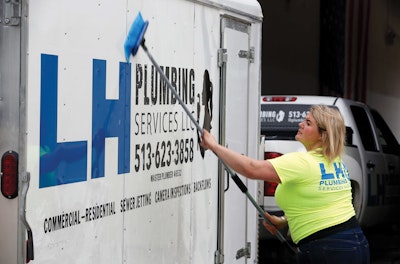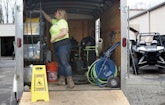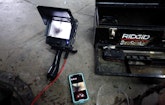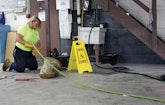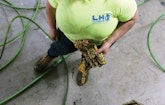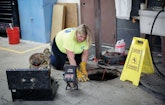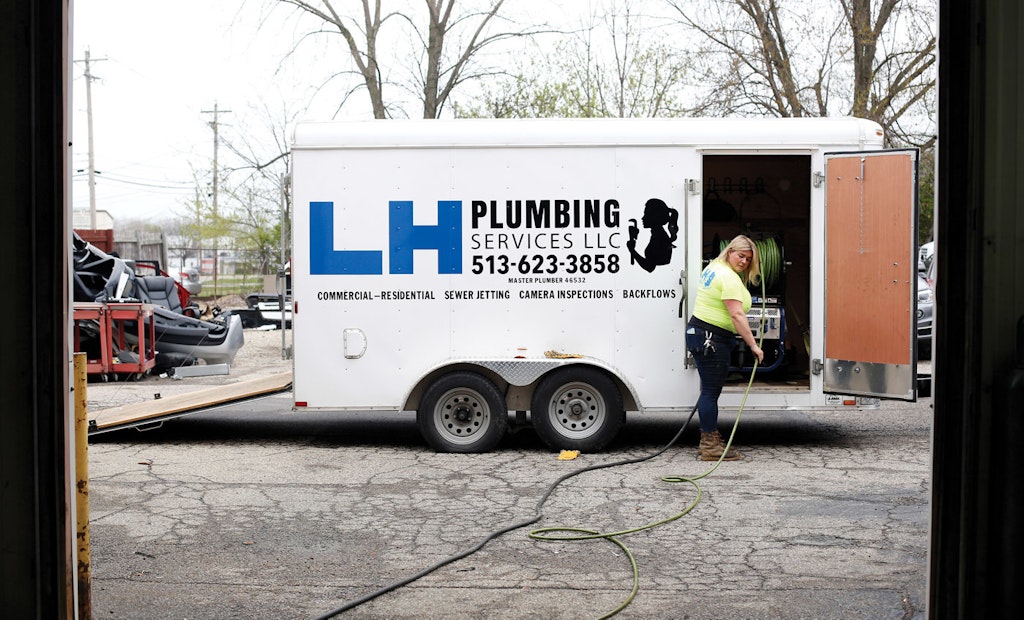
Linda Hudek, owner and operator of LH Plumbing unspools hose from her jetter (Jetters Northwest) to clean a sewer line at a commercial property.
There was a time when master plumber Linda Hudek, the owner of LH Plumbing Services in Fairfield, Ohio, owned only the bare minimum of draining cleaning equipment and subbed out larger jobs to local contractors she trusted.
Now the shoe is on the other foot, with nearly a dozen local plumbers hiring Hudek to handle their drain cleaning needs. Investing heavily in inspection cameras and other equipment has made her more efficient. It’s also amped up her revenue and profit margins — a win-win situation if there ever was one.
“It was a no-brainer,” says Hudek, 30, who started her business in 2010. “I saw an opportunity — the market was there. I was getting enough requests that I knew investing in cameras and jetting equipment would pay off.
“Not only are those machines huge moneymakers, they totally diversified my abilities and company,” she continues. “I went from someone who was just barely into drain cleaning and subbing things out to being able to take care of almost any problem. I want to offer customers complete service.”
Sure, the equipment represented a significant capital investment. But the financial results exemplify the old adage about the need to spend money to make money: She’s posted two record quarters revenuewise at the end of 2017 and the beginning of 2018. And she’s on pace to double her revenue compared to 2015 and prior years.
From agriculture to pipe wrenches
Oddly enough, Hudek never planned on becoming a plumber/drain cleaner. In fact, she had a scholarship lined up to study agriculture at Ohio State University. “I wanted to study horticulture and get into cut-flower farming,” she says.
Then fate intervened during the summer before her senior year in high school, when she worked for her father, John Hudek, a master plumber and the owner of J&H Mechanical Contractors in Somerville.
“After I graduated from high school, I went to work for him full time,” she explains. “I found I really liked working with my hands. I also liked the constant variety — the types of jobs and the people I met and worked with were never the same.
“I just enjoyed the controlled chaos,” she adds. “I knew I’d never be bored because there’s always a new challenge … and you have to use your head and think every day because you’re always getting thrown into new situations where it’s basically sink or swim.”
While working full time for her father, she also attended night classes at Miami University of Ohio and earned a degree in small-business management, with a minor in real estate, in 2009. “Sometimes my dad’s employees would drop me off at school after work and I’d be covered in mud and janitors would get on me,” she recalls.
Hudek knows of several other female plumbers in Ohio. But anyone who thinks she became a plumber to become a poster child for breaking the industry’s glass ceiling is mistaken. “I didn’t become a plumber to prove a point,” she states. “Male or female doesn’t matter. I’m a good plumber who’s earned the respect of my fellow plumbers and my customers. That’s what matters. My work speaks for itself.”
LH Plumbing Services’ Facebook page reflects that respect, with numerous testimonials from customers. A look at the site reveals nearly 2,000 likes and nothing but five-star reviews. “Linda is extremely knowledgeable and great to work with,” reads one comment. “When I was interviewing plumbers to install a tankless water heater, she was the only one who mentioned the specific code requirements or getting a permit and inspections. She did a great job at a reasonable price. Last Sunday morning, there was water spurting from a connector in my sump discharge pipe. I called her and she came over and fixed it that day. She’s the best!”
The company’s Facebook page also includes comments from other plumbers — even some from outside Ohio. In fact, she says a group of one-man shops in her area operate as friendly rather than cutthroat competitors. “We often work together and refer work to each other when we have too much work to handle,” she explains. “Most of us are very close, and we don’t talk badly about each other or steal each others’ customers. It works out very well.”
Equipment matters
To provide good customer service, Hudek runs a Chevrolet Silverado 3500 pickup truck that tows a 14-foot enclosed trailer built by Homesteader. The pickup carries a saddle toolbox and a Pack Rat pullout drawer unit from Weather Guard.
For drain cleaning, which generates about 45 percent of the company’s revenue, Hudek relies on a RIDGID K-1500 sectional machine, a Jetters Northwest 4009 Brute water jetter (4,000 psi at 9 gpm) skid-mounted inside the trailer, a Speedrooter drum machine made by General Pipe Cleaners, and a Flex Shaft drain cleaning cable made by Clog Squad. Hudek uses cutter heads and chain knockers made by Seweri Finland Oy and also owns two inspection cameras made by RIDGID (a SeeSnake nanoReel and a SeeSnake microReel), plus an Opticam unit manufactured by Insight Vision Cameras.
Hudek also invested in a PipePatch trenchless spot repair pipe rehab system made by Source One Environmental. For plumbing, she relies on power tools built by Milwaukee Electric Tool, RIDGID and Hilti.
Starting out from scratch, back when she didn’t have anywhere near as much equipment as she does now, wasn’t easy. Hudek says she struggled early on, subsisting on jobs passed to her by her father or working as a subcontractor for other plumbers. To make matters worse, she struck out on her own right at the height of the great economic recession — not exactly opportune timing.
“I was able to pay my bills and that was about it,” she says. “I tried some coupon magazines for advertising, but I’d never do that again. All I got were calls from people who were looking for cheap work and didn’t want to pay anything. So for the most part, I relied on word-of-mouth referrals and it kind of blossomed from there.”
Can-do attitude pays off
Just as important as her skills during those years was her attitude, reflected by her company’s short-and-sweet slogan: Can do. Hudek picked that up from her father, who was a Seabee in the U.S. Navy. (The nickname Seabees stems from the acronym for the group’s formal name, the U.S. Naval Construction Battalion.)
“Can do” is the Seabee’s motto, along with, “The difficult we do now; the impossible takes a little longer.” Hudek says that her father started calling her the “can-do kid” when she was a youngster. “He still calls me that, and it means a lot to me,” she says.
Hudek credits other factors or her success, too. “No. 1 is Jesus Christ, who’s blessed me with the abilities to do what I’m able to do. Then there’s my dad, who taught me about determination.
“I remember when I first started working for him, I messed something up with a backhoe,” she continues. “I tried to grade out an area and made an absolute mess of it. I cried in front of him. He said, ‘Why are you crying? That’s not going to fix anything!’ He taught me that without determination and resilience, I wasn’t going to go very far in this business.
Providing good customer service also has paid big dividends. That includes doing the little things right, like leaving a clean job site when she completes a job. “I really go the extra mile to clean things up,” she says. Educating customers also has been critical, she says, noting that it’s important to explain to customers what they’re getting for their money.
She also uses small-ball marketing techniques, such as giving customers refrigerator magnets and pens with her company’s name on them.
The price is right
But here’s perhaps one of the most important lessons she’s learned over the years: Building a business by trying to be the lowest-cost plumber in town is a recipe for failure. Hudek concedes that early in her career, she charged less than she should have, for two primary reasons. First of all, the economy was bad. Second, most of her customers at the time were commercial accounts that she felt she couldn’t afford to lose.
“I was afraid I wouldn’t have enough work, so I’d cave in to general contractors and customers,” she recalls. “I felt that I needed to keep these people happy because they’re my bread and butter and without them, I’d fail.”
The tipping point came during a service call for a commercial contractor. When Hudek arrived at the company to perform backflow tests, she encountered another plumbing company’s truck on site. Turns out they were completing a project on which Hudek had bid.
“I learned that they beat my price by $100,” she says. “I’d bent over backward many times over the years to accommodate that customer. But in the end, there was no loyalty to me — they were always going to go with the cheapest guy, no matter how long I worked for them. The relationship didn’t matter.”
As she finished the job, Hudek realized that this customer would continually be slow to pay and quick to complain about pricing. So she gave the stack of backflow reports to a receptionist and told her to tell the owner she didn’t want to work for the company any more. “From then on, I started working for people who respected me and respected my work,” she explains. “Now I tell people that I’m not a cheap plumber and I don’t do cheap work.
“I explain to them that they’re paying me for my expensive equipment investments and my knowledge and expertise,” she continues. “The people who buy into that concept are my customers. Everyone else can go pound sand. Learning to say no to those kinds of customers was huge. And I’m always trying to get other plumbers to realize they have to stop prostrating themselves before these guys like they’re our lords and masters.”
As for the future, Hudek says hiring a technician is the only way she could significantly further grow her business, given that she usually is working at full capacity. But managing employees can be stressful, so she plans to keep enjoying the freedom that comes from running a one-person shop, not to mention the great profit margins.
“In three to five years, I might have employees,” she says. “Then again, maybe not. But I don’t mind the unknown.”
Local competitors and Facebook buddies provide mentorship
An old saying notes that you can never have too many friends. It’s true in business, too, as Linda Hudek can attest.
The owner of LH Plumbing Services in Fairfield, Ohio, says that she has established solid and fruitful relationships with local competitors. Furthermore, ever since she struck out on her own in 2010, she’s also made long-distance friends — mostly via Facebook — who have contributed immeasurably to her success. She credits colleagues like Thomas Carlisle, the owner of Underground Connections in Wooster; Ben Kohn, who runs Sinks to Sewers in Ventura, California; and Nathan Hudelson, the owner of Schlueter Plumbing in Cincinnati.
“I joined a Facebook group called Plumbing Hacks, which has about 20,000 members,” she explains. “And through that, I was introduced to other groups, including the Sewer Roundtable (Facebook page), which specializes in drain cleaning and drain repair. We post pictures of our jobs, share family events, and discuss various business and work issues.
“By joining the groups and posting pictures of my work and my thoughts on things such as pricing, I’ve met a lot of plumbers, including local guys I actually didn’t know existed,” she continues. “I’ve learned a lot from these people — received business advice or heard about equipment I otherwise might not know about.”
A good example is PipePatch, a trenchless spot repair system made by Source One Environmental. Hudek purchased a PipePatch system in summer 2017 for roughly $4,000 and it has already paid for itself.
In particular, she says Carlisle and Kohn helped her understand the value of investing in better drain cleaning equipment that could diversify her services. They also taught her how to make jetting more profitable, she says. “When I told them how often I had to use other companies to do jetting work for me and how often the equipment I had at the time couldn’t get the job done, they helped me realize that I had enough work to purchase better equipment,” she says.
Hudek says that fellow plumbers also took time to educate her about how to jet more effectively. Some even showed her their inspection videos, she notes — a valuable instructional tool. “I learned a lot from them about things like the proper methods to inspect and record, as well as better jetting techniques,” she says. “Their advice has been invaluable — and their friendship even more so.”
